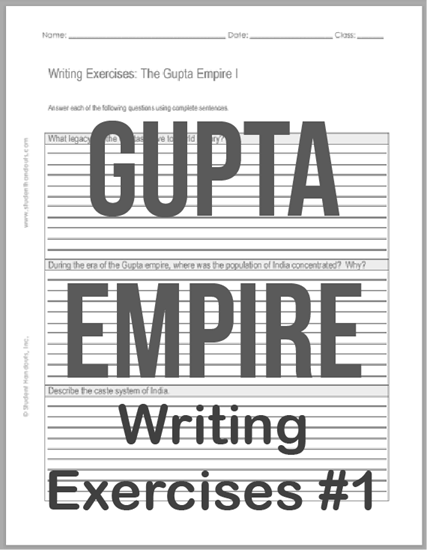| Gupta Empire Writing Exercises Sheet #1 |
|---|
| www.studenthandouts.com > World History > Ancient India > Ancient India Worksheets |
| Answer each of the following questions using complete sentences. 1. What legacy did the Guptas leave to world history? 2. During the era of the Gupta empire, where was the population of India concentrated? Why? 3. Describe the caste system of India. |
|---|
 |
 |
|---|
|
Click here to print this sheet of essay questions (PDF file). Answers will vary.
1. The Guptas left a profound legacy in world history through their contributions to mathematics, notably the concept of zero and the decimal system, which are fundamental to modern mathematics. Their advancements in astronomy, literature, and arts, including classical Indian dance and sculpture, influenced later cultures. The Gupta period's promotion of Hinduism and Buddhism shaped religious thought across Asia, establishing cultural and intellectual foundations that endured long after the empire's decline. 2. During the Gupta Empire, the population of India was concentrated in the fertile Indo-Gangetic Plain, encompassing the regions along the Ganges and Yamuna rivers. This area supported dense settlements due to its fertile soil, which was ideal for agriculture, and a favorable climate that ensured food security and economic prosperity. The river systems facilitated trade, transportation, and communication, contributing to the growth of urban centers and a thriving civilization. 3. The caste system of India is a hierarchical social structure dividing people into distinct groups based on birth and occupation. It comprises four main categories: Brahmins (priests and scholars), Kshatriyas (warriors and rulers), Vaishyas (traders and agriculturists), and Shudras (laborers and service providers). Below these are the Dalits or "Untouchables," who face significant discrimination. This system dictates social interactions, marriage, and job opportunities, deeply influencing Indian society and culture for centuries. [Tying this to current events, teachers may want to have students look at pushes to ban caste discrimination in the United States; see here.] |
|---|
| Ancient India Books and Films | Ancient India Outlines and PowerPoints |
| Ancient India Maps and Pictures | Ancient India Study Games |
| Ancient India Miscellany | Ancient India Worksheets |
| www.studenthandouts.com > World History > Ancient India > Ancient India Worksheets |









